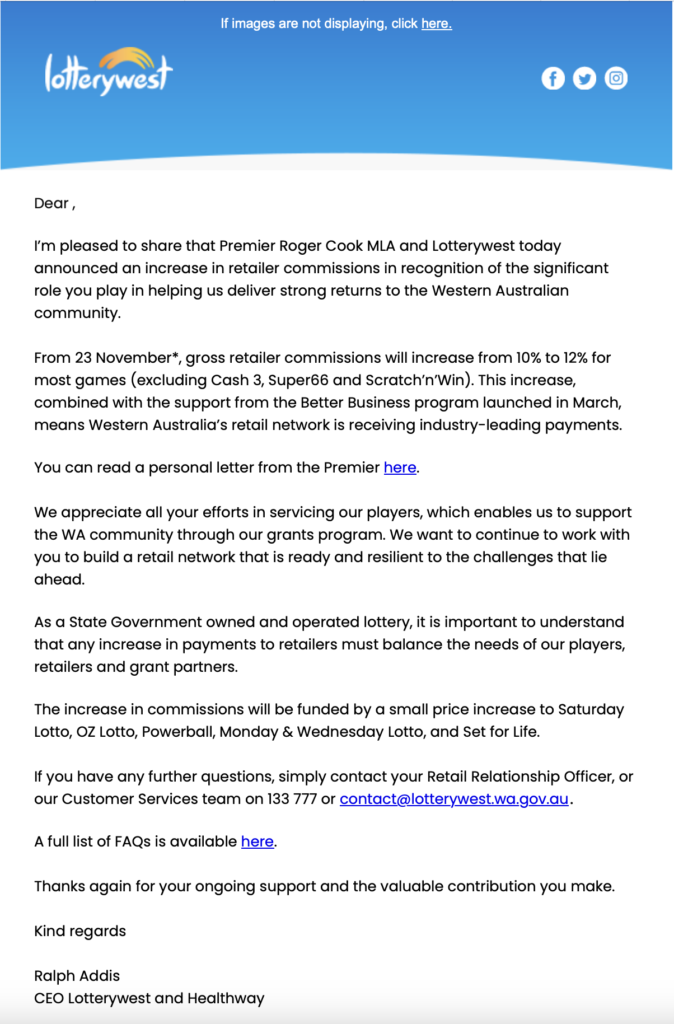at all leading newsagents ignorance
Magazine publishers seem to think we are leading if we stock their title. They seem to think we have control over the titles we stock.
From Sam Prince's secret sauce to our list of Australian startups that banked the lion's share of venture capital. This is Forbes Australia Issue Seven. Secure your copy at all leading newsagents. https://t.co/3juXuGXqcr pic.twitter.com/3Qp6aNCTqz
— Forbes Australia (@forbes_au) October 9, 2023
Health Food Guide pitches newsagents
Find the November Issue of magazine at your local newsagents and supermarkets!
Subscribe to Healthy Food Guide for your chance to WIN a copy of ‘Eat Plants, Be Happy!’ (50 copies to be won) valued at $39.99 each!https://t.co/gU63EDVmx3 pic.twitter.com/viwXE98UAA
— HFGAustralia (@HFGAustralia) October 9, 2023
Are Aussie card companies missing a Halloween opportunity
Engagement with Halloween has grown in Australia for sure over the years. we can see that on the streets, in sales of masks, costumes and home decor and in local events.
The one part that has not grown in Australia is greeting cards.
I am in the US at the moment and every card shop (large and small) has a big range of Halloween cards. All fun and spooky. Looking carefully at the ranges here, I am sure we are missing an opportunity in Australia.
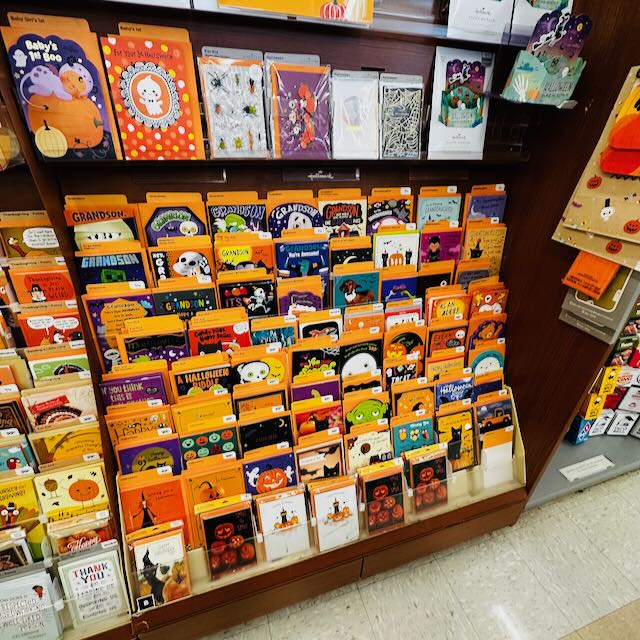
Halloween is a good party season. It’s family friendly, and something we can lean into beyond greeting card sales.
It’s also a good season to push us into Christmas.
I’d love to see Aussie card companies play in this space.
Terrific New York Toy Fair
Toy Fair in New York this past week was excellent. So many new products from large and small brands and so many insights from individual retailers to key partner brands.
This really is an important show for any retailer relying on toys for a key portion of revenue. I say this for a few reasons: you’ll see products well ahead of Australian release, you’ll get context that does not often travel, you can see broader trends beyond single brands.
While seeing new products is a delight, it’s the insights I appreciate the most, and sometimes it is not the most obvious insights that land the best. These can be small insights through to bigger.
Booth to booth and talking in the aisles, this trade show was terrific. US retailers are open to talking to folks from out of the country. They share terrific insights.
I have been for a few years and found this years Toy fair particularly useful.
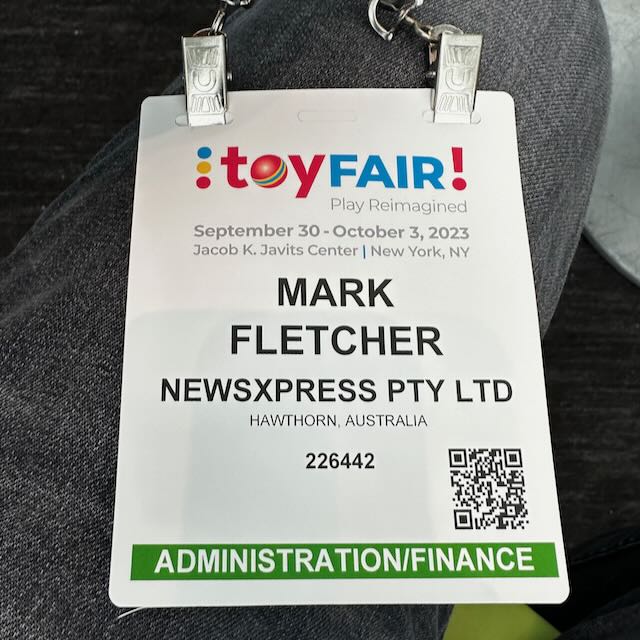
It was good seeing more Australians there than I’ve seen in the past.
One frustration is arrogant brands that don’t let you in if you are not an existing customer and have not made an appointment. While there aren’t many of these, there were enough to annoy me.
There were a few small makers at the trade show, which was interesting. A family making child products because of personal experience, a couple of game makers trying to pitch their games, and some slime . dough type products made in small batches with interesting stories.
While my key insights will be for newsXpress members, I’d note that there is a trend for indie retailers for small batch more locally made products, to differentiate from the mega brands that love big retailers so much.
Your local newsagency is not a child care centre
A mum a child, around 6 or 7, entered the newsagency the other day. Mum took the kid to our toys area, said something and left. We saw mum walk towards a nearby supermarket. We told the kid to go after their mum.
Mum came back with the kid and ripped into us telling us that we should not have told their kid to follow them, that it was none of our business. The admonishment went on for a bit.
We explained that we are not a child care service and that unattended children are reported to centre security, who will attend and remove them for their safety and our safety. The mum responded with even more choice words and admonishment.
This happens every could have weeks in the newsagency in a large shopping centre. Parents seem to think it is okay to leave their young kids with us while they shop elsewhere.
Our position is no, we’re not a child care service. Any child found in the shop alone is reported to security, for their own safety.
All that would need to happen is that a kid left alone trips or otherwise injures themselves in the shop without a parent present and we would be in a legal minefield.
Or, what if someone noticed a parent leaving a kid and the kid was taken by them? What then?
Parents leaving their kids don’t seem to have thought through the consequences of something going wrong in the shop while their kid is left without supervision.
It is frustrating that we have had to say on social media that our newsagency is not a childcare centre.
There may be some reading this who think it’s okay. We all have to made decisions on matters like this in the context of our own situation. The shop I am writing abut today is in a large Melbourne suburban centre. We are near two exist. Abduction would be easy. The kid drifting off to other shops would be easy, too, as would getting lost in a crowd.
The risk for the child and for us and those who work in the shop is too great. hence our zero tolerance policy.
Back to the kid who was left, given how the mum spoke to us, we feel for how life might be at home for the kid.
More challenges for vape retailers
I don’t know why any retailer sells vape products. They are a questionable product surrounded by controversy and, from a health perspective, leading to harm. I certainly have no interest in sticking vape products enemy shops.
But, since plenty of newsagents do …
A letter from the NSW Chief health Officer recently has raised alarm among vape retailers.
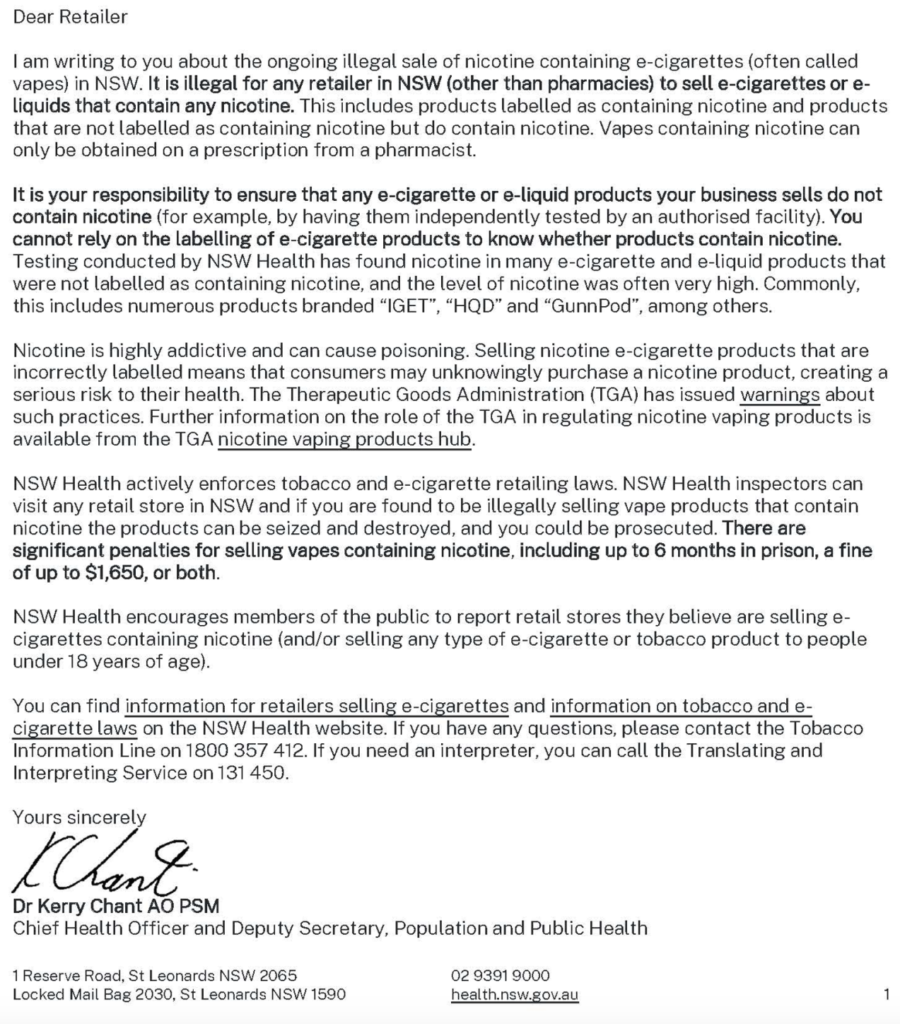
These statements are what really concern the retailers:
“You cannot rely on the labelling of e-cigarette products to know whether products contain nicotine.”
“It is your responsibility to ensure that any e-cigarette or e-liquid products your business sells do not contain nicotine (for example, by having them independently tested by an authorised facility)”.
Retailers and some who represent them say it is unfair that they, the retailers, have the obligation to determine if what they sell is legal. They say that governments, federal, state, should stop inadequately labelled and mislabelled products from getting into Australia.
The Australasian Convenience and Petroleum Marketers Association has written about this issue.
“Directing retailers to verify and certify the contents of products that they did not manufacture is far from reasonable and appears legally invalid. By default, it is an admission that Australian Governments are failing to properly enforcing labelling standards for vape products”, said ACAPMA CEO Mark McKenzie.
“Like their customers, retailers must be able to rely on the information provided on product labels and therefore all Australian governments have an absolute responsibility to ensure that manufacturers’ meet their legislative obligations in respect of product labelling – regardless of whether that relates to tobacco content, alcohol content, sugar content, fat content and so on”, added Mark.
While I get that product labelling is important and that retailers should be able to rely on labels. We know that right now with some vape products that is not possible. All of us in retail have an obligation to know what we are selling. If we cannot be sure, don’t sell it.
Let me finish by noting again that I have no interest in selling vape products in my newsagencies. I got out of tobacco in 1996. At that time my view was that the category had no place in a family friendly business.
Promoting a book I wrote
Not Dead Yet. Stories from the last stop is a collection of fictional short stories that I wrote. It’s just been published and I’ve been doing interviews to promote it, including this conversation with The Art Hunter:
What’s SEN doing with the AFL Record and why is it so hard to buy in Melbourne?
This week should have been a bumper week for Melbourne newsagents with a terrific traffic bounce from shoppers buying the AFL Record.
Plenty didn’t get stock Monday.
Then, yesterday, some did not get what they would usually sell, let alone what they could sell with Collingwood in the Grand Final.
Emails and other attempts to contact the publisher have resulted in silence, bet they passed me email onto Are Direct and I did get a helpful response from them for which I am grateful. But they are only the distributor and can only deal with what they are given.
It’s as if SEN don’t care about the frontline retailers getting asked questions by people wanting to buy their Grand Final AFL Record early in the week.
Who knows what SEN thinks, because they don’t respond.
Shoplifting is theft and should be dealt with as such
Shoplifting is on the rise, not only in Australia but around the world according to published news reports from the UK, UK and plenty of other countries.
Businesses that do not have structured processes in place are more likely to be targeted. Businesses that do not know the cost of this theft until long after it has occurred are likely to be hit the most.
A newsagent I was talking to the other days told me when they caught it as long as they got the items back they punished by banning the shopper from the store.
In my view, the only way to deal with shoplifting, retail theft, is to bring in the police. Every time. No matter the value of the theft.
The more all newsagents in our channel do this the more it is discussed and the less of a target we will be.
Why, and when I say every time, I even mean in the situation where a spouse was found to be the person stealing from the business, to feed a gambling addiction.
There are some good shoplifting prevention / response resources online:
- Crime Stoppers South Australia.
- Victoria Police.
- Tasmania Police.
- Crime Prevention NSW.
- National Retail Association.
There are plenty more resources than these. Doing nothing is a mistake, which will cost businesses and communities plenty.
Tobacco shop fires in Melbourne concern newsagents
Newsagents with shops next to or near tobacco shops are concerned for their own businesses in the event of an attack.
With so many attacks in recent months, I suspect all retailers near tobacco shops are concerned. An insurance broker I spoke with said it has to play out in terms of policy cost.

Just when we thought the culprits had been caught, more attacks came.
With most newsagents out of selling tobacco, many of us for more than 10 and 15 years, it’s nearby shops that are the concern, as they are potential targets. Illegal tobacco appears to be at the heart of the crime wave.
One of my shops has had a new tobacco shop open next door. It’s an odd looking business. Very open. dark. Inviting people deep in to purchase.
We have checked our preparedness, security and insurance. I think it makes sense for all Victorian newsagency businesses located next to or near a tobacco shop to do the same.
I know that what’s happening in Melbourne is causing worry for some local retailers. It’s best we focus our attention on that over which we do have control.
Tower Systems offers newsagents half price websites
A beautiful POS software connected Shopify website for a newsagency costs $7,995.00 (inc. GST).
Right now, my software company, Tower Systems, is offering this full service website development package for $4,000.
Shopify is an excellent choice for newsagents and other local retailers because maintaining the website is easy. It does to require specialist technical skills. Plus, it comes with excellent marketing tools and an easy to have products listed on Google.
Tower has made hundreds of Shopify websites already.
Here is what is included in the half price offer for newsagents.
For ease of reference and clarity, below is a numbered list of all work and tasks included in the above quote and work you will have to do. This is the complete list.
- Shopify account. We would use our development account until such time, as we deliver the live site to you. Once this has occurred you will need your own Shopify account and we will transfer the site to you. We can help with this.
- Theme selection. We will guide you through theme selection options. Themes determine the in-built features and layouts throughout your site. You will have a free choice of ONE available at themes.shopify.com. Choose carefully as once we begin the personalisation and customisation process, changing themes will incur additional fees.
- Overall design to be applied to the theme selected to customise the look and feel of the site. While there is back and forth involved, the design process is not priced to be an extended back and forth process. It is critical you are clear as to your requirements. Some adjustments can be made within the quote but any major diversion from the original theme may add to the cost.
- The site we create will have the following elements:
- Including text and images (which you are to provide), and site navigation. We would also recommend including a business location map as this is important so local people can find your store (Google account needed).
- Creation of the menus that drive your site.This is as important as the look and feel and should be carefully considered.
- Social media links to your: Facebook, Twitter, Instagram and Pinterest.
- About page. Your text, describing you and your business: 150 – 350 words. Well written, clear as to what you and your business are about.
- Shipping, returns and other policies. We can use yours or you can edit ours and use it.
- Contact us page showing your contact details as well as an enquiry form.
- Configured Product Pages. Creation of up to 2 different product template pages, these pages show the images and details about products. If additional product templates are required, then these are charge at $440 per page.
- Shopify Inbox setup, if you want chat turned on.
- Blog feed. A blog allows you to publish your own news.
- Flat Rate shipping based on Shopify’s inbuilt shipping profiles.
- The setup of loading of products into the site via a live link to the Retailer software. We would need you to have this data in Retailer ready for export.
- Interfacing to standard gateways: Shopify Payments and Paypal. In addition to credit card payments, Shopify Payments can also connect to Shop Pay, Apple Pay and Google Pay. Please note that depending on required site functionality it may not be possible to use the express checkout options. We will advise if this is the case.
- EXTRA COST OPTION: Interfacing to Humm, Zip and Afterpay and other Shopify supported payment methods incur an additional fee of $220 per payment method.
- Training: over the phone and usually around two hours. We’d like 2 people from the business there as we have found this helps the business get the most from it.
While this post is a promotion for the newsagency website offer from Tower Systems, it also outlines what’s involved in detail enough for newsagents to be more informed when shopping around for a website.
Hey Aussie magazine publishers, Best Bets shows you how to drive traffic for newsagents and sales of your magazines
If you love racing, @bestbetsracing is perfect for you! 🐎
Available from newsagents or download your copy today: https://t.co/IigwCO0dG5 pic.twitter.com/Etb48oAFgq
— Best Bets Racing (@bestbetsracing) September 22, 2023
Strong boxed card sales auger well for Christmas
For years now I have tracked early boxed Christmas card sales and followed through Christmas season sales and see in data over years a clear indicator for Christmas in early boxed Christmas card sales.
This year, I am seeing boxed Christmas card sales up on last year.
To me, this suggests a strong Christmas in our space.
We’re not doing anything out of the ordinary to pitch boxed Christmas cards. They are out on the shop floor, front of store, and online. No discounting. No deals.
The average early in the season boxed card shopper buys three packs. They often purchase other things at the same time. They are a good customer. Half the time a regular and half the time not.
Charity range is key to sales I have found. Indeed, it’s something customers comment on.
We’ve had boxed Christmas cards out for just over a month,. It’s been well worth it and have already received our first top-up order in a couple of locations.
Lotterywest appreciates its retail network
I am grateful for the opportunity to attend the 90th birthday celebration of Lotterywest in Perth last week. It was a terrific night celebrating this much-loved organisation.
It was wonderful hearing stories of how grants from Lotterywest to community groups and others had helped so many locally. From local schools to health organisations to environment projects, funds from Lotterywest make a positive impact in Western Australia.
It was equally wonderful hearing genuine appreciation expressed for the retail network, which is primarily made up of newsagents. The Premier, Lotterywest Chair and others all commented on the importance of the retail network and the true partnership between them and the Lotterywest organisation.
You only have to see the recent commission increase, recall the generous financial support through Covid and understand their process for new outlets to see the practical and mutually valued nature of the relationship.
The Premier in his speech made note that Lottery was unique, the only state owned lottery business in Australia. This ownership position is key to the practical value Lotterywest is able to deliver for local communities as well as between supplier and retail partner.
Newsagents at the event were appreciative of Lotterywest. I think key to that is the trust and respect for the Lotterywest brand in the community. Selling Lotterywest products is like selling support for the local community.
Happy birthday Lotterywest and may there be many many more understate ownership.
Now, this is a way to pitch a newsagency for sale
Well done HSH Business Sales in Cheshire, United Kingdom.
LOTTERY/NEWSAGENTS: ASHTON-UNDER-LYNE: located within Ashton Market Hall, surrounded by a large number of independent traders, close to the entrance, facing a large sandwich shop, takings £7,500 per week plus £260 lottery commission per week, GP 35%, rent £166 per week pic.twitter.com/vi7t2C5yVl
— HSH Business Sales (@hshbusiness) September 6, 2023
When was the last time shoppers lined up outside the newsagency for a new product launch?
Thursday last week, September 7, at 8:30 in the morning, most newsXpress stores had a line of shoppers, people on the phone and people online.
The majority were new shoppers engaging with the business for the first time.
They were there because one of the newsXpress preferred suppliers promoted newsXpress stores to their massive (huge) email database.
Thursday last week was release day for several coins from the Royal Australian Mint, a partner of newsXpress.
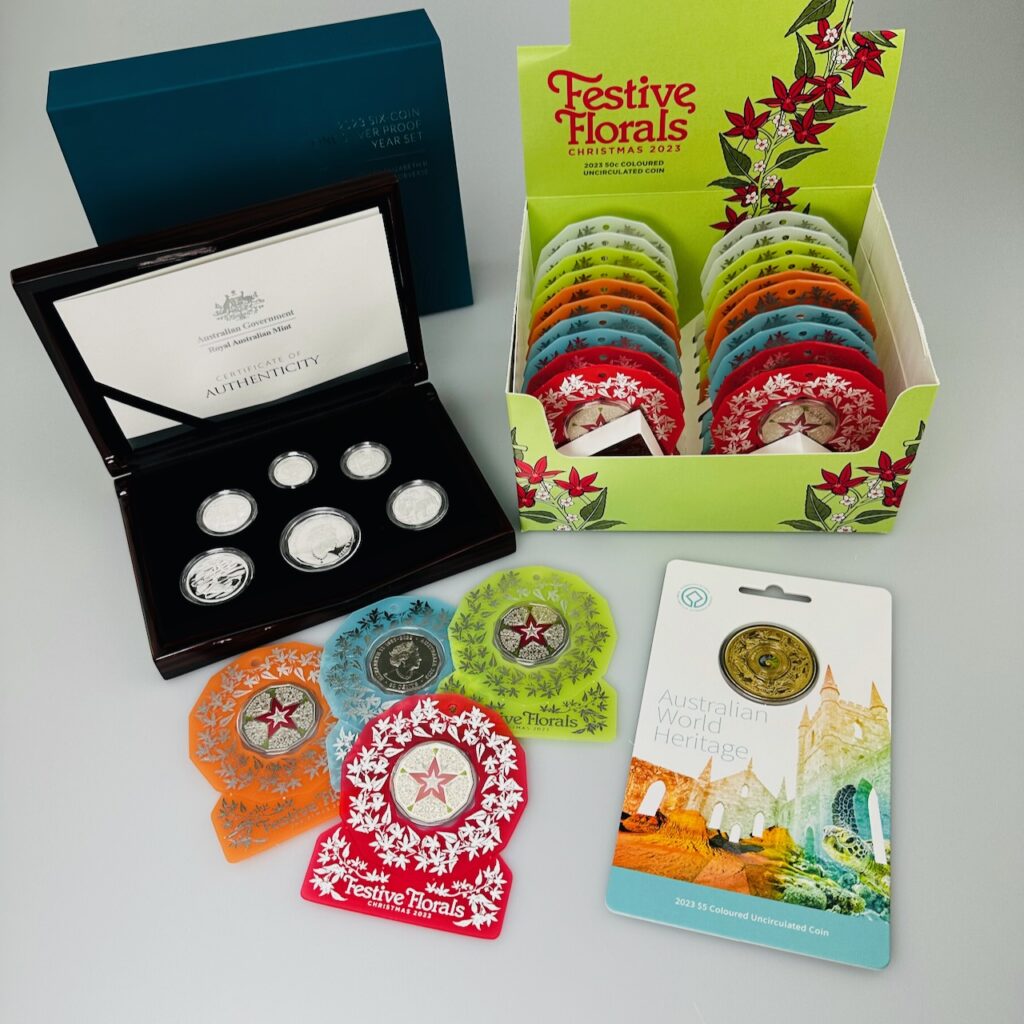
While every shop sold out quickly, plenty of the first time shoppers bought other things, including coins released earlier in the year. A typical shop did an extra $4,000 that day.
Around 75% of the time, coin shoppers purchase other products. They are valuable shoppers to attract, more efficient per visit. Basket depth is prized by retailers as are basket value and margin dollars banked.
One of the items released last Thursday, a $375.00 set, Wass the best seller in part because only 1,000 were made and they had to be split between overseas outlets, the Mint shop, coin dealers, and other retailers, like newsXpress stores. This coin is currently fetching close to $900 on eBay. No wonder it was popular.
The $5 colour frosted World Heritage coin, priced at $30 and in the bottom right corner of the photo, is currently fetching around $300 on eBay.
The key thing that happened Thursday beyond the sales themselves was the new shopper traffic. New shopper traffic is essential for the health of any retail business. It is vital for newsagencies with some tent-pole product categories transitioning from physical retail.
There are ways to leverage vertical new shopper traffic – specific product category driven new shopper traffic. This is where retailers can maximise value from such opportunities – even when such new shopper visits are one-off visits.
I’ve heard some in our channel downplay coins as a valuable category. Such comments are typically made by people who don’t have access to them, or have not tried them.
Thursday last week demonstrated the value. Engagement Friday, Saturday and even Sunday has reinforced it with hundreds of dollars of coin gift products selling each day to shoppers who discovered us in this category because of the promotion of Thursday’s release.
Now, here’s the pitch. remember, I an a Director of newsXpress.
newsXpress works hard to help its members attract new shoppers. We pitch products and back this with in-store advice, social media assets, partner support help selling online.
If you want to attract new shoppers to your newsagency, consider newsXpress. It’s easy to make many times for the $225 a month membership fee. Click here for our latest information document or email our team for more information at: help@newsxpress.com.au.
FREE advice for local retailers: Nine one-percenters that could add thousands to the value of your retail business.
One-percenters are small things, easy things you can do for a win.
They are often things others forget.
Today I share nine of what I think are the best one-percenters for any local indie retail business.
I’ve experienced the value of on-percenters like these.
This is free advice. You don’t have to buy anything to access it. I love seeing local indie retailers thrive.
- Place 2 or 3 products at the counter for impulse purchase. Change weekly, unless they are selling well.
- If you have a front window, change it weekly. The goal is to stop passers-by and have them notice you.
- Never be out of stock of popular products. Use your software to predict sales and order so you don’t sell out.
- Price new stock on the shop floor, located to disrupt shopper traffic, so they notice. People don’t buy from the back room.
- Use social media to share knowledge and have fun rather than promoting products. Entertain.
- Have a staff product of the week in a good position with a handwritten note from the staff member explaining the why.
- Write the value of dead stock somewhere where all staff see it. Update it weekly for a whole of business focus on reducing this.
- Offer genuine loyalty rewards that don’t cost you the farm and are easy for shoppers to understand and access.
- Colour block in a prime position. This gives products rarely in prime position to be seen. It shows off your range diversity.
What you do with this is 100% top to you. The thing is, I know these tips work. Combine them and you compound the value you achieve. It’s simple – a small time investment for a terrific return.
I like engaging with small steps. They are manageable, safe, certain. It means you’re not relying on one or two big moves, often costly moves, for your success. By spreading the risk, the load, you strengthen the foundations of the business and position it for more certain results.
Here’s the colour block tip in action. It took half an hour to do, and shoppers noticed while it was being created, they added suggestions too. The result speaks not only to red, but also diversity and to fun we have in the shop by being different.
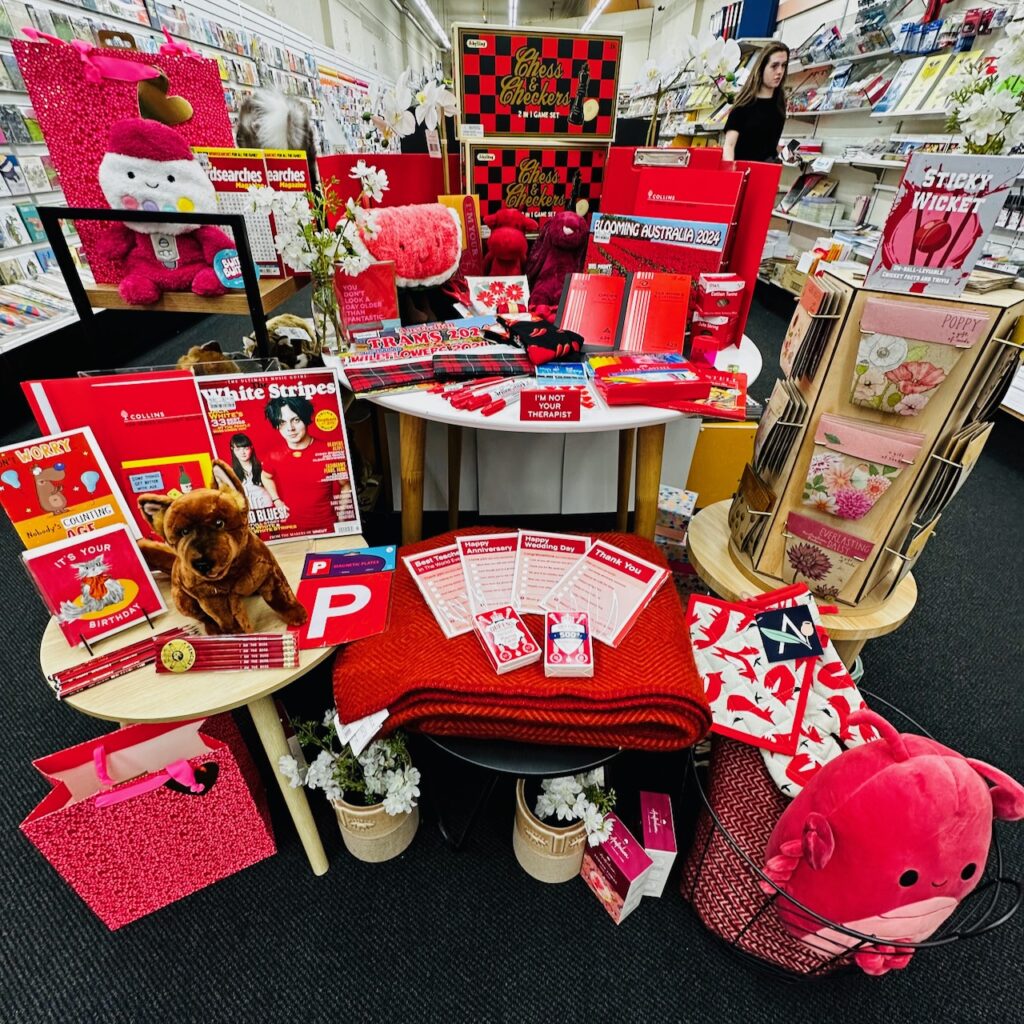
What you do about the 9 tips is up to you of course, but let me ask you this: are you happy with the performance of your business? If you say yes, great! If you say no, you know you have to make some changes because doing the same things will give you the same results.
The advice in this post originated from newsXpress advice to its newsagency marketing group members years ago. The one-percenters list has evolved considerably, as it should.
